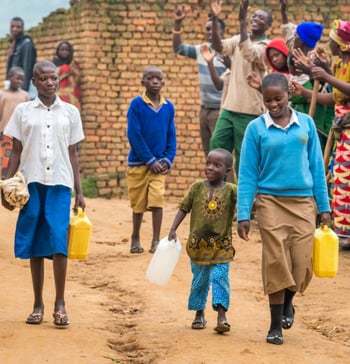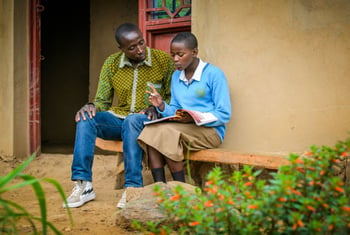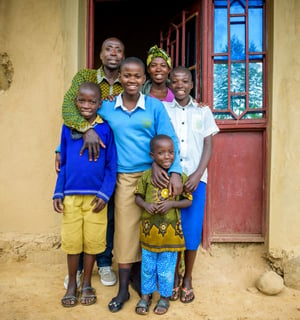 |
Isabelle, the one smiling in the blue sweater, is 16 years old. What’s right? She is healthy. She is carrying crystal clear water from a tap just minutes from her home. She is in school. She’s among the top 5 in her class. And she is not married.
World Vision believes that ending extreme poverty is possible, but it won’t happen as long as half the population is held back from reaching their full potential. The evidence is indisputable, when girls and women get equal access and opportunity - progress is accelerated, families are stronger, and communities are more prosperous.
The reality is, women and girls living in poverty face significant barriers in every area of their lives. That’s why we focus on equipping and empowering women and girls in all areas of our work.
- She can be born healthy when her mother has access to critical information and basic healthcare.
- When there is clean water right in her village, she can go to school instead of spending those hours collecting dirty water that could make her sick.
- She can marry when and who she chooses when her community begins to turn away from harmful traditional practices like child marriage.
- When she has access to financial services, vocational training, and better farming methods, she can become financially literate, start a business, increase her farm’s output, and improve her family’s income.
When given the chance, she can achieve. And when she does, she will share that success with her family, become a leader in her community and use her voice, her strength, and her determination to make a difference.
In just the last two years, World Vision has reached millions of girls and women who are now living safer, healthier, and more productive lives. Girls like Isabelle.
 |
|
Isabelle reading to her father |
In Rwanda’s Gicumbi district, Isabelle and her community are thriving, thanks in large part to a 6.8-kilometer-long water pipeline that benefits nearly 6,000 people in 14 villages.
Her parents, Thacien Utazirubanda and Vestine Mukamukwiye, married in 1999. Thacien is a proud father. He says oldest daughter Isabelle was #1 in her class from Primary 1-6. Now she goes to a tougher school but she still is fourth or fifth.
Says Thacien, “Before, we got the flowing water, we had unbalanced health and regular sickness. When I washed my white shirts, they would turn gray. We often used to be checked for worms.” In the last six months, they haven’t gone to the hospital.
 |
|
Isabelle and her family |
“The children used to feel sick”, says Vestine. “No child goes to the clinic now. We are drinking clean water. We know it’s World Vision that has enabled us to get this. I attribute my happiness to World Vision.”
On International Women's Day, we celebrate the progress in the lives of women and girls, and the positive impact it’s having on families, communities, even nations. The end of poverty? It begins with her.
Please join us in our commitment to #BalanceForBetter. Because when her potential is unleashed, extreme poverty doesn’t stand a chance.







